新概念英语2 非谓语动词复习课件 (共77张PPT)
文档属性
| 名称 | 新概念英语2 非谓语动词复习课件 (共77张PPT) |  | |
| 格式 | zip | ||
| 文件大小 | 656.3KB | ||
| 资源类型 | 教案 | ||
| 版本资源 | 新概念英语 | ||
| 科目 | 英语 | ||
| 更新时间 | 2023-02-17 14:31:32 | ||
图片预览

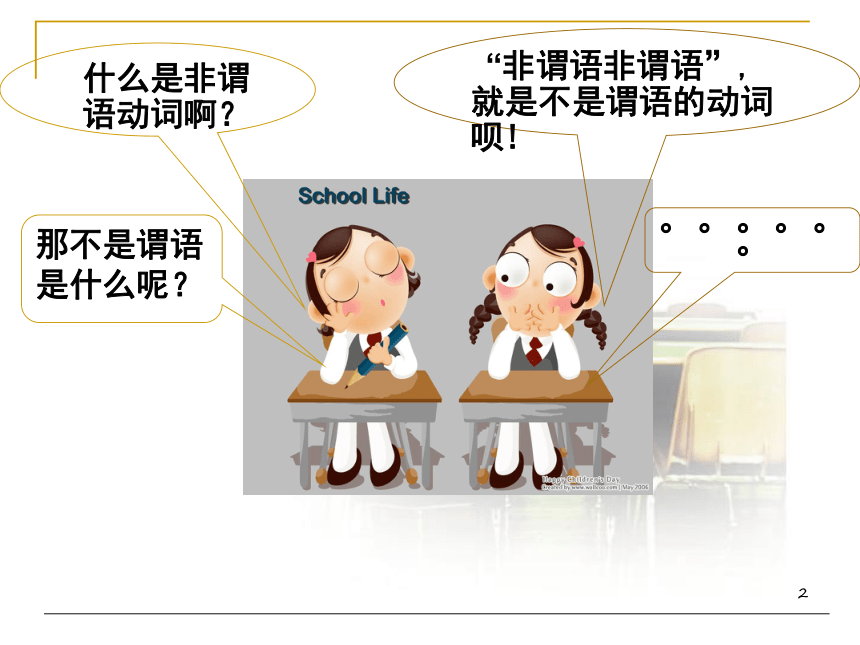

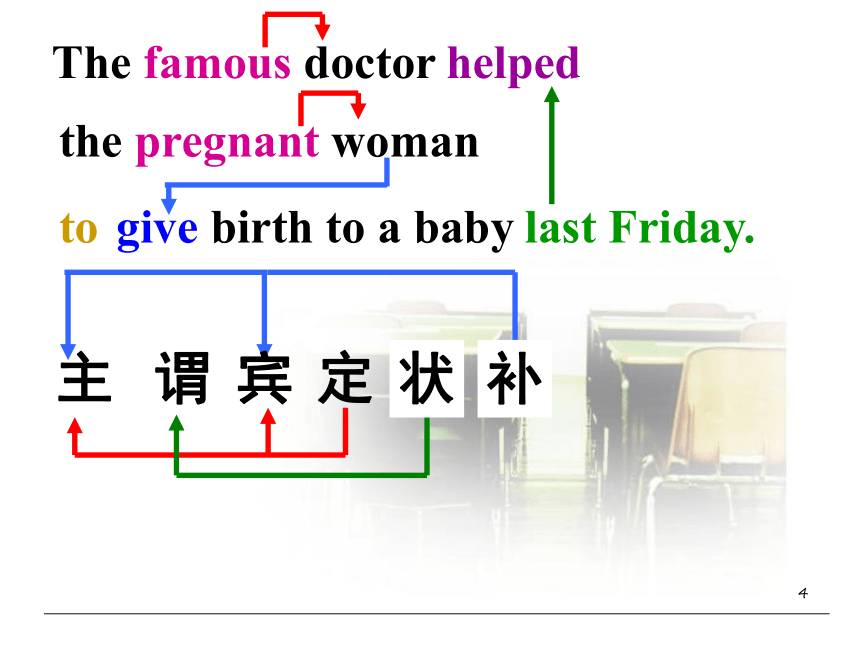
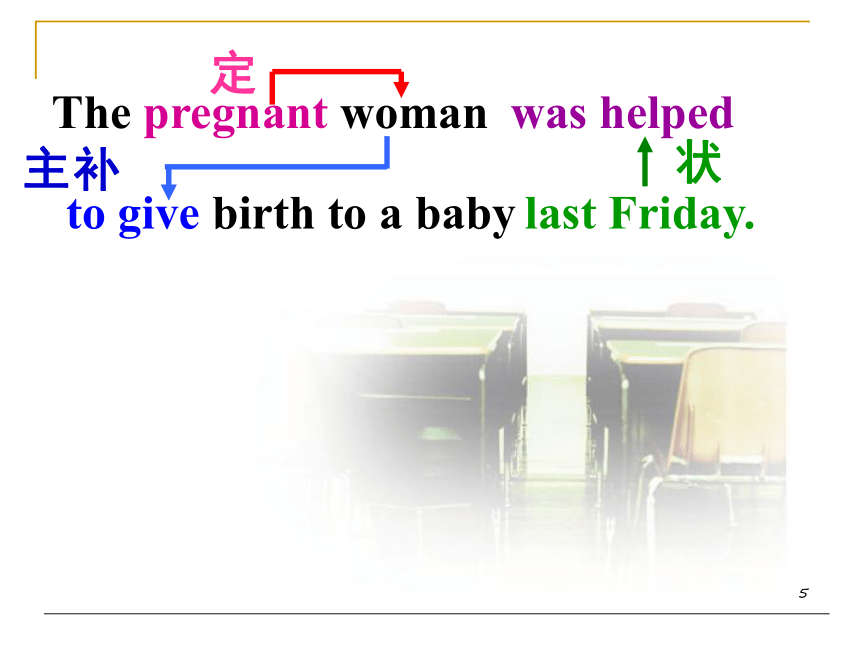
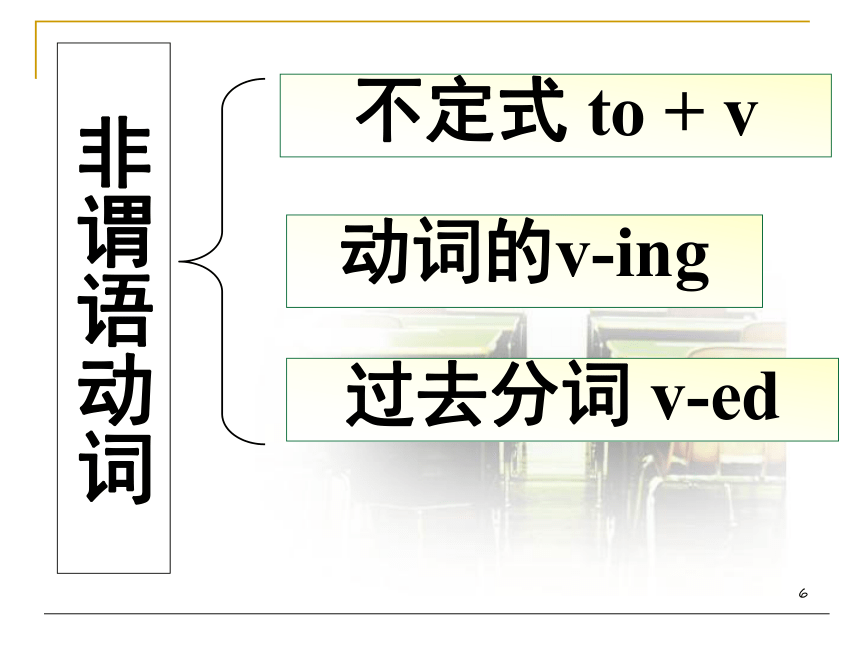

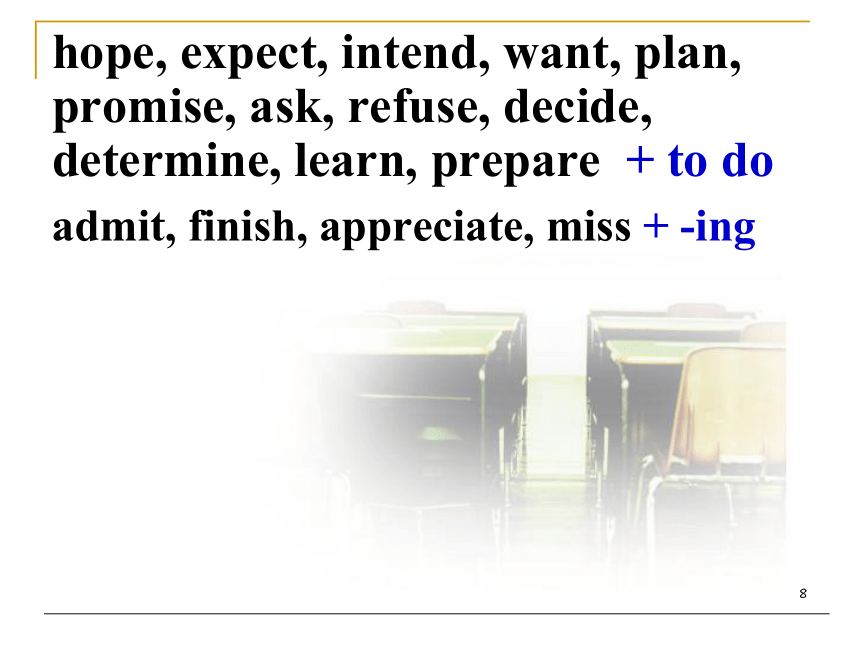

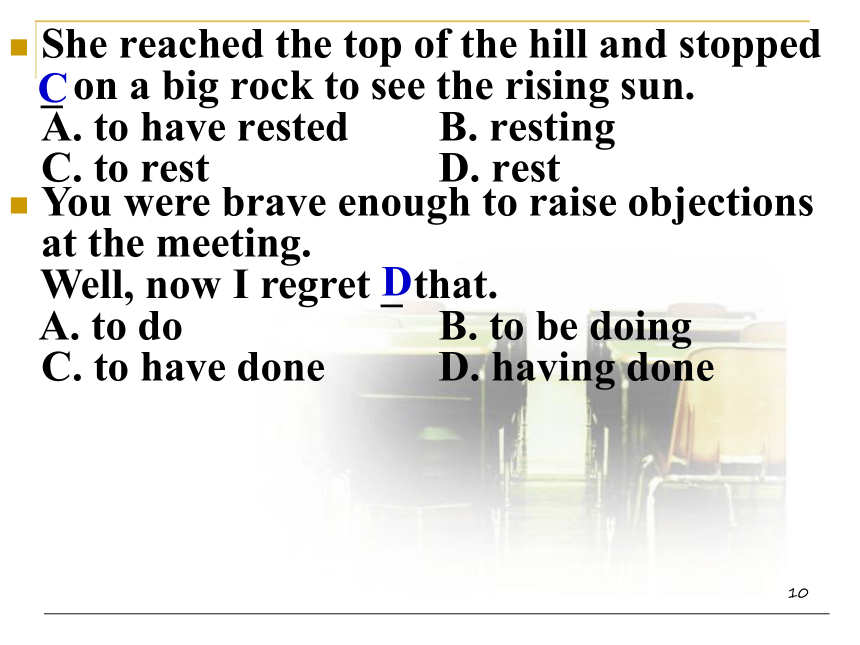
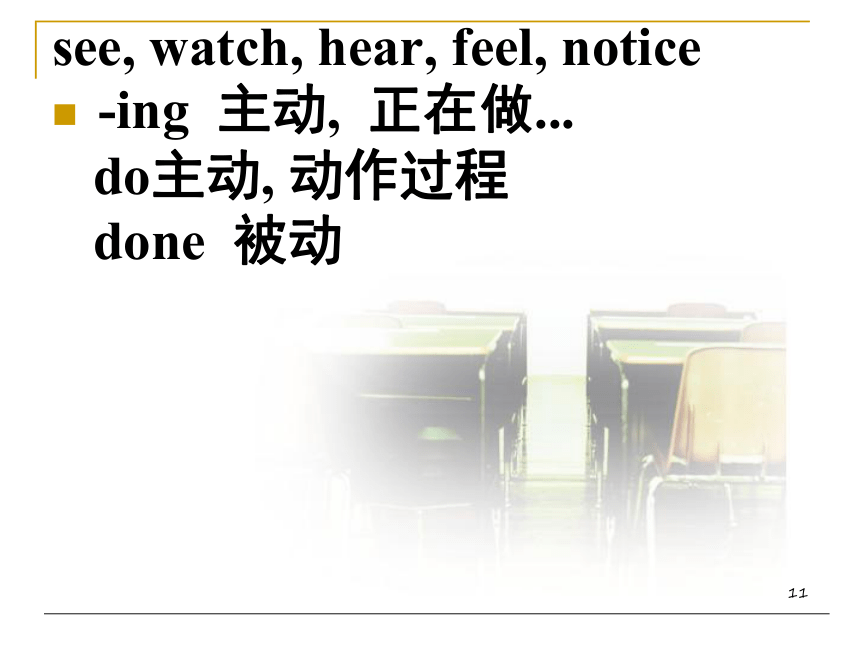
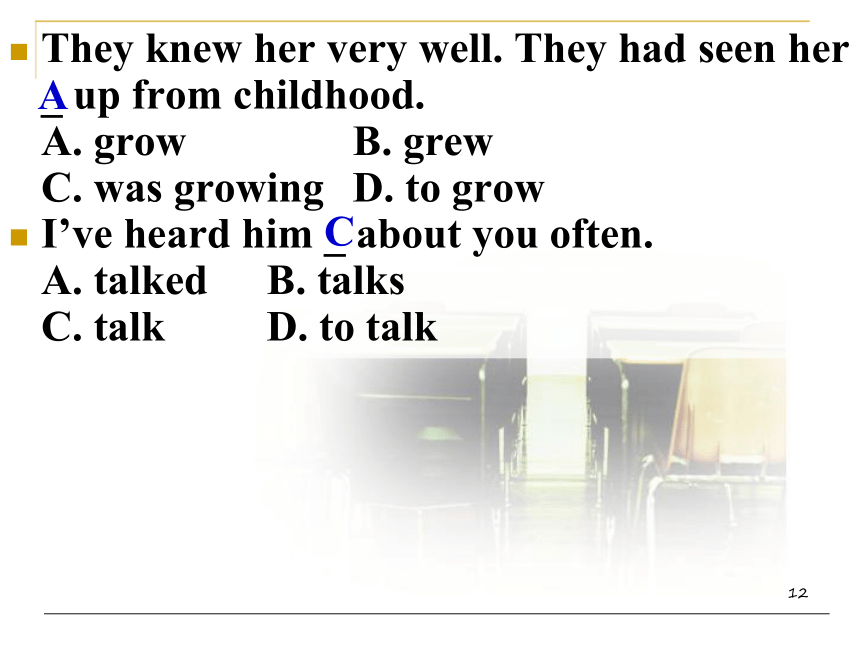
文档简介
(共77张PPT)
非谓语动词
1
*
什么是非谓
语动词啊?
“非谓语非谓语”,就是不是谓语的动词呗!
那不是谓语
是什么呢?
。。。。。。
*
英语一句话只能有一个主谓结构
如果出现更多动词:
加连词(and / but / so…)
放入从句
变为非谓语动词
主语、谓语、宾语、定语、状语、补语
*
主
谓
宾
定
状
补
2
The famous doctor
give birth to a baby
helped
the pregnant woman
last Friday.
to
*
The pregnant woman
to give birth to a baby
was helped
last Friday.
定
状
补
主
*
过去分词 v-ed
不定式 to + v
动词的v-ing
非谓语动词
*
to + v
v-ing
v-ed
区 别
将要发生的
同时发生
被动
*
hope, expect, intend, want, plan, promise, ask, refuse, decide, determine, learn, prepare + to do
admit, finish, appreciate, miss + -ing
*
stop/remember/forget/go on/regret
to do 去做...
-ing 正在做...
*
She reached the top of the hill and stopped
_ on a big rock to see the rising sun.
A. to have rested B. resting
C. to rest D. rest
C
You were brave enough to raise objections
at the meeting.
Well, now I regret _ that.
A. to do B. to be doing
C. to have done D. having done
D
*
see, watch, hear, feel, notice
-ing 主动, 正在做...
do主动, 动作过程
done 被动
*
They knew her very well. They had seen her _ up from childhood.
A. grow B. grew
C. was growing D. to grow
I’ve heard him _ about you often.
A. talked B. talks
C. talk D. to talk
A
C
*
mean to do
doing
打算做
意味着
If you think that treating a woman well
means always _ her permission for things,
think again.
A. gets B. got C. to get D. getting
D
*
非谓语动词题目三步走:
谓语动词/句型的要求
主被动关系
时间先后顺序
判定题目是否考察非谓语
*
He walked down the hills, _ softly to
himself.
A. sing B. sings
C. singing D. was singing
He walked down the hills, and _ softly
to himself.
A. sing B. sings
C. singing D. was singing
C
D
*
Stop running and you will feel your
heart _ faster than ever.
A. beat B. beating
C. beaten D. was beating
Having passed all the tests, she felt a
great weight _ off her mind.
A. taking B. taken
C. take D. to be taken
B
B
*
非谓语动词的 9 种形式
done
-ing
to do
被动
主动
被动
主动
完成式
一般式
to do
doing
done
to be done
being done
to have done
have done
to have
been done
having
been done
having
be done
have done
have been
done
*
I am sorry to hear that.
I am sorry to have heard that.
I am sorry to have said that.
I am sorry to say that.
to do 和to have done
*
作定语
作宾语
作补语
作状语
作主语
*
宣言
给
的黑奴带来了希望。
犹如灯塔的光芒,
千万在那摧残生命的不义之火中受煎熬
这一庄严
*
被动
主动
主动
语态
(同时)进行
(之后)将来
时间先后
(与谓语动词)
-ed
-ing
to do
位置
作定语
1前2后
*
-ing和-ed形容词
单个-ed/-ed, 前置
-ing+名词:表示用途
a swimming pool=a pool for swimming
a reading room=a room for reading
*
The girl who is sitting in the corner is adorable.
We visited a temple which was built 200 years ago.
后置定语相当于省略的定语从句
*
■ The vegetables which are sold in this shop are grown without chemicals.
27
The houses which are being built are for the survivors in the quake.
*
■ The girl who has passed the exam is my gf.
错(完成式不能作定语)
having
*
-ing/-ed形容词:
–ing: 主动;
-ed: 被动;
*
a moving film
the moved audience
an exciting news
a broken heart
an interesting story
a satisfied smile
-ing形容词多修饰物
-ed形容词多修饰人或与人有关的物
*
He is_________.
He has a _________ look on his face.
frightened/frightening
frightened/frightening
frightened
frightening
*
Everyone was _____ by the ______
story. (move)
He was _______ with the ________
person. (annoy)
moved
moving
annoyed
annoying
*
Did you enjoy yourself at the party
Yes. I’ve never been to _ one before.
A. a more excited
B. the most excited
C. a more exciting
D. the most exciting
C
*
Poor boy! His _ looks and _hands
suggested he was very afraid.
A. frightening; trembling
B. frightened; trembled
C. frightening; trembled
D. frightened; trembling
D
*
The problems _ at the meeting
tomorrow are really hard to solve.
A. discussed B. to discuss
C. to be discussed D. discussing
C
*
The flowers __ sweet in the garden attract the visitors to the beauty of nature.
A. to smell B. smelling
C. smelt D. to be smelt
B
*
Mr. Green stood up in defense of the 16-year-old boy, saying that he was not the one __.
A. blamed B. blaming
C. to blame D. to be blamed
C
*
主动表被动:
感官动词smell/sound/taste...
blame/worth/worthy/worthwhile
*
作宾语
I love you.
I love walking along the seaside with you.
I love to walk along the seaside with you.
*
常用to do作宾语的动词
常用-ing作宾语的动词
*
to have been done
完成
being done
to be done
被动
-ing
to do
have done
to
have done
having
-ing/to do作宾语的变形
完成被动
have been done
having
39
*
The squirrel (松鼠) was lucky that it just missed _.
A. catching B. to be caught
C. being caught D. to catch
C
*
Police are now searching for a woman who is reported to _ since the flood hit the area last Friday.
A. have been missing
B. have got lost
C. be missing
D. get lost
A
*
作定语
作宾语
作补语
作状语
*
作补语
人/物1
动作1
动作2
人/物2
主语
谓语
宾语
补语
发出
发出
作用在
*
see
watch do
hear + sb./sth. + doing
feel done
notice
被动句还原to
感 官 动 词
*
I saw two boys fight with each other.
Two boys were seen to fight with each other.
宾语补足语
主语补足语
46
*
do
have/make/let + sth./sb. doing
done
to do
get/leave + sth./sb. doing
done
doing
keep sb./sth
done
被动句还原to
使 役 动 词
*
A cook will be fired if he is found __ in the kitchen.
A. smoke B. smoking
C. to smoke
*
My mother makes me learn English every day.
I am made to learn English every day.
宾语补足语
主语补足语
48
*
作状语
to do
-ing
done
*
to tell (you) the truth
to be honest
to be frank
to speak frankly
to begin/start with
strange to say
needless to say
*
to do作状语可句首可句尾,
但在句尾不可用逗号分开,
only to除外
We eat to live, but not live to eat.
To live we eat.
We eat, to live. (错)
We eat, only to live. (表示出乎意料的结果)
*
The news reporters hurried to the
airport, only _ the film stars had
left.
A. to tell B. to be told
C. telling D. told
B
*
He hurried to the booking office, only
_ that all the tickets had been sold
out.
A. to tell B. to be told
C. telling D. told
B
*
He was busy writing a story, only __
once in a while to smoke a cigarette.
A. to stop B. stopping
C. to have stopped D. having stopped
B
*
被动
之前
having been done
主动
之前
having done
被动
同时
being done
主动
同时
(基本同时)
doing
(和主语)
主被动
(与谓语比)
时间先后
-ing作状语
*
We sat on the high hillock and listened to the old story.
We sat on the high hillock, listening to the old story.
As soon as we heard the news, all Chinese people got excited.
Hearing the news, all Chinese people got excited.
*
he dated with another girl.
He had broken up with his gf.
He dated with another girl.
Having broken up with his gf,
he dated with another girl.
His gf dumped him.
He dated with another girl.
Having been dumped by his gf,
*
If you work hard, you’ll succeed.
Working hard, you’ll succeed.
If you look from the hill, you’ll find the city looks like an ant.
Looking from the hill, you’ll find
the city looks like an ant.
*
_ the letter, he went out to post it.
A. Writing B. Being written
C. Having written D. Written
C
他
写信
主动
写信
寄信
*
_ full preparations, we decided to put off the meeting till next week.
A. We had not made
B. Having not made
C. Not made
D. Not having made
D
决定延期
没准备好
我们
主动
没准备好
*
done作状语
被动关系
不强调时间先后
*
_ in a red skirt in the opening ceremony
of the Olympic Games, the little girl
Lin Miaoke won the hearts of the people
all over the world.
A. Dressed B. Worn
C. Dressing D. Wearing
A
*
“穿戴”:wear/put on/dress
wear状态, “穿着”,
put on动作,“穿上”,
dress 动作, “给…穿衣” dress sb.
状态, sb. be dressed in…
“坐”:sit/seat
sb. sit, I sit here.
sb. be seated, I am seated here.
sit=be seated
*
When I arrived, I found the boy _.
A. seating B. seated
C. is seating D. sits
I found the boy was seated
I found the boy was sitting.
B
*
非谓语动词题目三步走:
谓语动词/句型的要求
主被动关系
时间先后顺序
判定题目是否考察非谓语
作定语完成式禁用
作状语to do在句末不能用逗号隔开
only to表出乎意料结果除外
*
-ing
复合结构
my/your...
人/物’s
I’m happy for your telling me the truth.
I’m angry for your not telling me the truth.
*
The discovery of new evidence led to _. A. the thief having caught B. catch the thief C. the thief’s being caught D. the thief to be caught
C
*
__ the meeting himself gave them a great deal of encouragement.
A. The president will attend
B. The president to attend
C. The president attended
D. The president’s attending
D
*
独立主格结构
非谓语动词,
主语+谓语
名词/代词+
动作的逻辑主语
*
falling here and there, I
suddenly notice autumn is drawing upon.
completed, we’ll have a global traveling.
Leaves
Task
*
The country has already sent up three
unmanned spacecraft, the most recent
__ at the end of last March.
A. has been launched
B. having been launched
C. being launched
D. to be launched
B
*
The children went home from the
grammar school, their lessons _ for
the day.
A. finishing B. finished
C. had finished D. were finished
B
*
作主语
作表语
*
It is +adj.+ of
sb. to do sth.
for
of, for区别:
当adj是修饰sb时用of
当adj是修饰sth时用for
It is very kind __ you to help us.
It is difficult __ us to learn English well.
of
for
*
作主语视为单数
To go to bed early and to get up early
_ a good habit for us.
A are B is C was D were
B
*
做表语
眼见为实。
Seeing is believing.
对等原则,主语和表语形式一致
To see is to believe.
*
特殊疑问词+to do
Give me where to stand, and I’ll move
the world.
*
Thank you!
非谓语动词
1
*
什么是非谓
语动词啊?
“非谓语非谓语”,就是不是谓语的动词呗!
那不是谓语
是什么呢?
。。。。。。
*
英语一句话只能有一个主谓结构
如果出现更多动词:
加连词(and / but / so…)
放入从句
变为非谓语动词
主语、谓语、宾语、定语、状语、补语
*
主
谓
宾
定
状
补
2
The famous doctor
give birth to a baby
helped
the pregnant woman
last Friday.
to
*
The pregnant woman
to give birth to a baby
was helped
last Friday.
定
状
补
主
*
过去分词 v-ed
不定式 to + v
动词的v-ing
非谓语动词
*
to + v
v-ing
v-ed
区 别
将要发生的
同时发生
被动
*
hope, expect, intend, want, plan, promise, ask, refuse, decide, determine, learn, prepare + to do
admit, finish, appreciate, miss + -ing
*
stop/remember/forget/go on/regret
to do 去做...
-ing 正在做...
*
She reached the top of the hill and stopped
_ on a big rock to see the rising sun.
A. to have rested B. resting
C. to rest D. rest
C
You were brave enough to raise objections
at the meeting.
Well, now I regret _ that.
A. to do B. to be doing
C. to have done D. having done
D
*
see, watch, hear, feel, notice
-ing 主动, 正在做...
do主动, 动作过程
done 被动
*
They knew her very well. They had seen her _ up from childhood.
A. grow B. grew
C. was growing D. to grow
I’ve heard him _ about you often.
A. talked B. talks
C. talk D. to talk
A
C
*
mean to do
doing
打算做
意味着
If you think that treating a woman well
means always _ her permission for things,
think again.
A. gets B. got C. to get D. getting
D
*
非谓语动词题目三步走:
谓语动词/句型的要求
主被动关系
时间先后顺序
判定题目是否考察非谓语
*
He walked down the hills, _ softly to
himself.
A. sing B. sings
C. singing D. was singing
He walked down the hills, and _ softly
to himself.
A. sing B. sings
C. singing D. was singing
C
D
*
Stop running and you will feel your
heart _ faster than ever.
A. beat B. beating
C. beaten D. was beating
Having passed all the tests, she felt a
great weight _ off her mind.
A. taking B. taken
C. take D. to be taken
B
B
*
非谓语动词的 9 种形式
done
-ing
to do
被动
主动
被动
主动
完成式
一般式
to do
doing
done
to be done
being done
to have done
have done
to have
been done
having
been done
having
be done
have done
have been
done
*
I am sorry to hear that.
I am sorry to have heard that.
I am sorry to have said that.
I am sorry to say that.
to do 和to have done
*
作定语
作宾语
作补语
作状语
作主语
*
宣言
给
的黑奴带来了希望。
犹如灯塔的光芒,
千万在那摧残生命的不义之火中受煎熬
这一庄严
*
被动
主动
主动
语态
(同时)进行
(之后)将来
时间先后
(与谓语动词)
-ed
-ing
to do
位置
作定语
1前2后
*
-ing和-ed形容词
单个-ed/-ed, 前置
-ing+名词:表示用途
a swimming pool=a pool for swimming
a reading room=a room for reading
*
The girl who is sitting in the corner is adorable.
We visited a temple which was built 200 years ago.
后置定语相当于省略的定语从句
*
■ The vegetables which are sold in this shop are grown without chemicals.
27
The houses which are being built are for the survivors in the quake.
*
■ The girl who has passed the exam is my gf.
错(完成式不能作定语)
having
*
-ing/-ed形容词:
–ing: 主动;
-ed: 被动;
*
a moving film
the moved audience
an exciting news
a broken heart
an interesting story
a satisfied smile
-ing形容词多修饰物
-ed形容词多修饰人或与人有关的物
*
He is_________.
He has a _________ look on his face.
frightened/frightening
frightened/frightening
frightened
frightening
*
Everyone was _____ by the ______
story. (move)
He was _______ with the ________
person. (annoy)
moved
moving
annoyed
annoying
*
Did you enjoy yourself at the party
Yes. I’ve never been to _ one before.
A. a more excited
B. the most excited
C. a more exciting
D. the most exciting
C
*
Poor boy! His _ looks and _hands
suggested he was very afraid.
A. frightening; trembling
B. frightened; trembled
C. frightening; trembled
D. frightened; trembling
D
*
The problems _ at the meeting
tomorrow are really hard to solve.
A. discussed B. to discuss
C. to be discussed D. discussing
C
*
The flowers __ sweet in the garden attract the visitors to the beauty of nature.
A. to smell B. smelling
C. smelt D. to be smelt
B
*
Mr. Green stood up in defense of the 16-year-old boy, saying that he was not the one __.
A. blamed B. blaming
C. to blame D. to be blamed
C
*
主动表被动:
感官动词smell/sound/taste...
blame/worth/worthy/worthwhile
*
作宾语
I love you.
I love walking along the seaside with you.
I love to walk along the seaside with you.
*
常用to do作宾语的动词
常用-ing作宾语的动词
*
to have been done
完成
being done
to be done
被动
-ing
to do
have done
to
have done
having
-ing/to do作宾语的变形
完成被动
have been done
having
39
*
The squirrel (松鼠) was lucky that it just missed _.
A. catching B. to be caught
C. being caught D. to catch
C
*
Police are now searching for a woman who is reported to _ since the flood hit the area last Friday.
A. have been missing
B. have got lost
C. be missing
D. get lost
A
*
作定语
作宾语
作补语
作状语
*
作补语
人/物1
动作1
动作2
人/物2
主语
谓语
宾语
补语
发出
发出
作用在
*
see
watch do
hear + sb./sth. + doing
feel done
notice
被动句还原to
感 官 动 词
*
I saw two boys fight with each other.
Two boys were seen to fight with each other.
宾语补足语
主语补足语
46
*
do
have/make/let + sth./sb. doing
done
to do
get/leave + sth./sb. doing
done
doing
keep sb./sth
done
被动句还原to
使 役 动 词
*
A cook will be fired if he is found __ in the kitchen.
A. smoke B. smoking
C. to smoke
*
My mother makes me learn English every day.
I am made to learn English every day.
宾语补足语
主语补足语
48
*
作状语
to do
-ing
done
*
to tell (you) the truth
to be honest
to be frank
to speak frankly
to begin/start with
strange to say
needless to say
*
to do作状语可句首可句尾,
但在句尾不可用逗号分开,
only to除外
We eat to live, but not live to eat.
To live we eat.
We eat, to live. (错)
We eat, only to live. (表示出乎意料的结果)
*
The news reporters hurried to the
airport, only _ the film stars had
left.
A. to tell B. to be told
C. telling D. told
B
*
He hurried to the booking office, only
_ that all the tickets had been sold
out.
A. to tell B. to be told
C. telling D. told
B
*
He was busy writing a story, only __
once in a while to smoke a cigarette.
A. to stop B. stopping
C. to have stopped D. having stopped
B
*
被动
之前
having been done
主动
之前
having done
被动
同时
being done
主动
同时
(基本同时)
doing
(和主语)
主被动
(与谓语比)
时间先后
-ing作状语
*
We sat on the high hillock and listened to the old story.
We sat on the high hillock, listening to the old story.
As soon as we heard the news, all Chinese people got excited.
Hearing the news, all Chinese people got excited.
*
he dated with another girl.
He had broken up with his gf.
He dated with another girl.
Having broken up with his gf,
he dated with another girl.
His gf dumped him.
He dated with another girl.
Having been dumped by his gf,
*
If you work hard, you’ll succeed.
Working hard, you’ll succeed.
If you look from the hill, you’ll find the city looks like an ant.
Looking from the hill, you’ll find
the city looks like an ant.
*
_ the letter, he went out to post it.
A. Writing B. Being written
C. Having written D. Written
C
他
写信
主动
写信
寄信
*
_ full preparations, we decided to put off the meeting till next week.
A. We had not made
B. Having not made
C. Not made
D. Not having made
D
决定延期
没准备好
我们
主动
没准备好
*
done作状语
被动关系
不强调时间先后
*
_ in a red skirt in the opening ceremony
of the Olympic Games, the little girl
Lin Miaoke won the hearts of the people
all over the world.
A. Dressed B. Worn
C. Dressing D. Wearing
A
*
“穿戴”:wear/put on/dress
wear状态, “穿着”,
put on动作,“穿上”,
dress 动作, “给…穿衣” dress sb.
状态, sb. be dressed in…
“坐”:sit/seat
sb. sit, I sit here.
sb. be seated, I am seated here.
sit=be seated
*
When I arrived, I found the boy _.
A. seating B. seated
C. is seating D. sits
I found the boy was seated
I found the boy was sitting.
B
*
非谓语动词题目三步走:
谓语动词/句型的要求
主被动关系
时间先后顺序
判定题目是否考察非谓语
作定语完成式禁用
作状语to do在句末不能用逗号隔开
only to表出乎意料结果除外
*
-ing
复合结构
my/your...
人/物’s
I’m happy for your telling me the truth.
I’m angry for your not telling me the truth.
*
The discovery of new evidence led to _. A. the thief having caught B. catch the thief C. the thief’s being caught D. the thief to be caught
C
*
__ the meeting himself gave them a great deal of encouragement.
A. The president will attend
B. The president to attend
C. The president attended
D. The president’s attending
D
*
独立主格结构
非谓语动词,
主语+谓语
名词/代词+
动作的逻辑主语
*
falling here and there, I
suddenly notice autumn is drawing upon.
completed, we’ll have a global traveling.
Leaves
Task
*
The country has already sent up three
unmanned spacecraft, the most recent
__ at the end of last March.
A. has been launched
B. having been launched
C. being launched
D. to be launched
B
*
The children went home from the
grammar school, their lessons _ for
the day.
A. finishing B. finished
C. had finished D. were finished
B
*
作主语
作表语
*
It is +adj.+ of
sb. to do sth.
for
of, for区别:
当adj是修饰sb时用of
当adj是修饰sth时用for
It is very kind __ you to help us.
It is difficult __ us to learn English well.
of
for
*
作主语视为单数
To go to bed early and to get up early
_ a good habit for us.
A are B is C was D were
B
*
做表语
眼见为实。
Seeing is believing.
对等原则,主语和表语形式一致
To see is to believe.
*
特殊疑问词+to do
Give me where to stand, and I’ll move
the world.
*
Thank you!
同课章节目录
